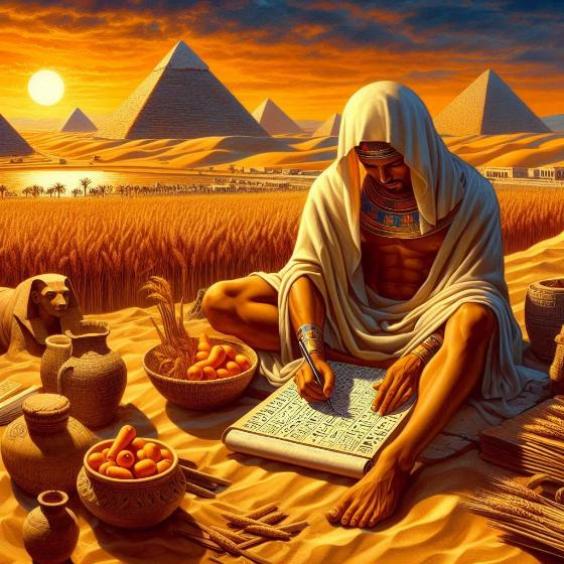History of accounting in ancient Egypt
Accounting, one of the essential tools for the management of goods and resources, has its roots in antiquity. In ancient Egypt, one of the first civilizations to meticulously organize its economy, accounting practices emerged that laid the foundations for what we now know as accounting.
Historical and Economic Context
The Egyptian civilization, developed on the banks of the Nile River more than 5000 years ago, was characterized by its high social and economic organization. The economy was based mainly on agriculture, livestock, and commerce. The Nile River provided fertile lands that facilitated the cultivation of wheat, barley, and flax, resources that had to be managed with precision.
The pharaoh, as the highest authority, supervised the distribution and control of these resources. It was essential to keep a record of the harvests, tributes, and payments to workers to ensure the supply of food and materials necessary for large projects, such as the construction of temples and pyramids.
Scribes and Accounting
The scribes, a special class of educated officials, were in charge of keeping these records. They were experts in reading and writing hieroglyphs and using basic calculation tools. These officials worked in temples, warehouses, and government offices, and their task was to record transactions, payroll, and inventory control of grains, livestock, and other goods, as well as calculate taxes and keep accounts of the state's income and expenses.
Inventory control in Egypt was not limited to raw materials. It also extended to labor. The scribes recorded the number of workers and the tasks assigned to each one, maintaining strict control of human resources.
Accounting Tools and Systems
The Egyptians used papyrus to keep their records. The scribes used ink and reeds (a type of pen made from cane) to write. They also used a primitive form of abacus, which allowed them to perform basic mathematical calculations, such as addition and subtraction. The Egyptian numerical system was decimal, and its symbols allowed the representation of units, such as tens, hundreds, and thousands.
Accounting records were kept in three main categories:
- Harvests and Food: Control of stored and distributed grain, as well as agricultural products intended for marketing and consumption.
- Labor and Services: Registration of workers, payment in kind (grain, beer, fabrics), and assignment of tasks in large works.
- Tributes and Taxes: Control of tributes in products or work, which subjects delivered to the pharaoh or the temples.
Impact of Accounting on Administration
Accounting allowed the Egyptians to effectively control their economy, avoiding shortages and facilitating the organization of resources in times of crisis. Thanks to this administration, the Egyptian state was able to undertake large projects such as the construction of the pyramids of Giza and other impressive monuments that have endured to this day.
In addition, accounting was not limited to resource control but also served as a form of communication and supervision between different provinces. Local administrators reported to the pharaoh on harvests and tributes collected, maintaining close vigilance over the administration of the kingdom.
Accounting Legacy of Ancient Egypt
The accounting legacy of Egypt has been preserved thanks to documents such as the Abusir Papyrus, which contains detailed records of income and expenses, and the Rhind Papyrus, a mathematical treatise that shows the advanced numerical knowledge of this civilization. These papyri and other texts have allowed historians to better understand how the administration and economy of ancient Egypt functioned.
Egyptian accounting was not limited to resource control but also reflected the political and social structure of the country. Over the centuries, this practice evolved and was adopted and adapted by other cultures, such as the Greek and Roman, laying the foundations for the development of modern accounting.
Accounting in ancient Egypt was not just a set of techniques for recording transactions but a fundamental tool for the administration and control of one of the most advanced civilizations of antiquity. Its influence transcended borders and eras, leaving a legacy that still endures in the modern accounting world.
The next time you contemplate the imposing pyramids and temples of Egypt, remember that behind their construction, there was not only labor and resources but also meticulous planning and rigorous control, guided by the first forms of accounting that humanity knew.







